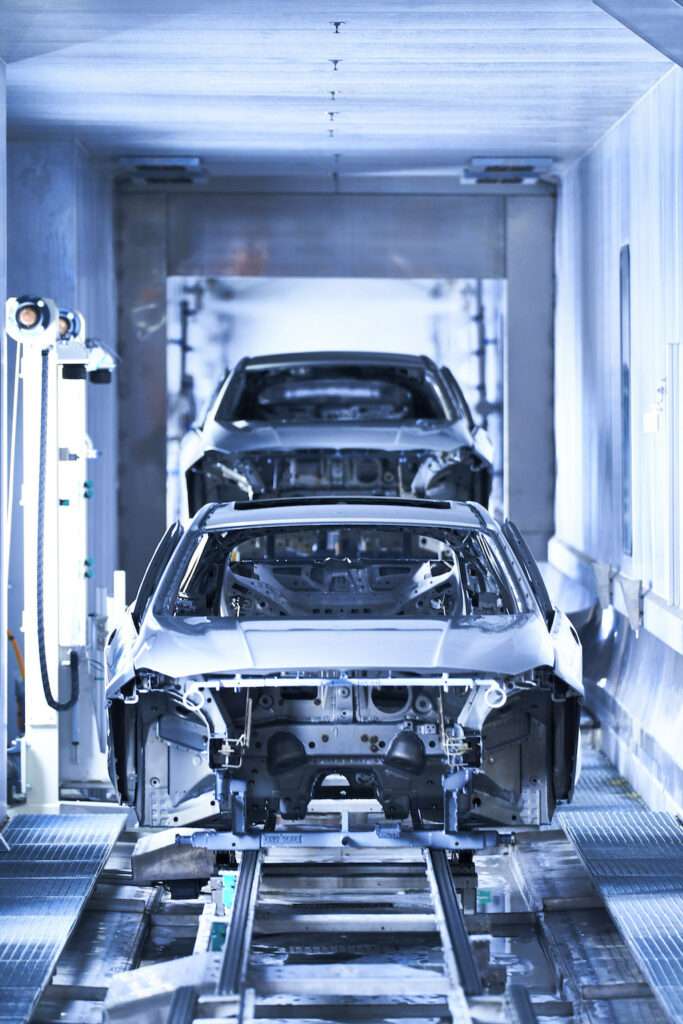As German automotive company BMW increases efforts to green its fleet, it has become the world’s first automobile manufacturer to use paint made from biomass.
In a new partnership with BASF, BMW says it has been able to replace crude oil-based paints at its European manufacturing plants with a sustainable alternative. Instead, the carbon-neutral car manufacturer says it’s using a matte paint made from biomass, including waste from sewage treatment plants.
The switch in materials is coming from renewable raw materials and will assist in reducing the carmaker’s CO2 emissions by more than 15,000 tons by 2030.

“By reducing our use of fossil raw materials, we can conserve natural resources and lower CO2 emissions at the same time. To achieve this, we are increasingly relying on sustainability innovations in our supplier network,” Joachim Post, member of the Board of Management of BMW AG responsible for Purchasing and Supplier Network, said in a statement. “Innovative paints based on renewable raw materials are an important step in this direction.”
BASF coating
The carmaker says its plants in Leipzig, Germany, and Rosslyn, South Africa, are now also using a sustainable corrosion protection material as well. The two BMW Group plants produce an average of around 250,000 vehicles per year.
“As a corrosion protection technology with optimum protection of edges, the CathoGuard 800 e-coat helps millions of cars live longer,” BASF says. “Its biomass-balanced version, CathoGuard 800 ReSource, adds a reduced carbon footprint to the e-coat application’s material efficiency, without changing the product’s formulation.”
The innovations come by way of tech from BASF, the German chemical company and the largest chemical producer in the world. According to BMW, BASF’s tech has allowed the car manufacturer to replace naphtha, a petroleum based material. The raw materials replaced were independently verified, BASF says.
“As the largest provider of chemical products to the automotive industry, we are aware of our responsibility to support our customers with innovative, eco-efficient solutions,” said Dr. Markus Kamieth, Member of the Board of Executive Directors of BASF SE. “The biomass balance approach allows us to make our coatings solutions even more sustainable while retaining the same quality. We are delighted that the BMW Group has chosen to play a pioneering role in the automotive industry and that our products play a key part in helping it achieve its ambitious sustainability goals.”

According to BMW, the amount of paint purchased is calculated to be “exactly equivalent to the amount of bio-naphtha and bio-methane that would be required for 100-percent petroleum-free production,” BMW Group said. The sustainable manufacturing process reduces the CO2 emissions from paint production by more than 40 percent.
BMW’s sustainability innovations
The new paint follows other innovations on BMW exteriors. Last January, BMW unveiled a concept car with a color-changing exterior that it said could help to improve fuel efficiency.
“In an all-electric car, changing the color in line with the weather can therefore also help to increase the range,” the company said. In warmer weather, a lighter color would reflect the heat, reducing the air-conditioning needs. Likewise, in colder weather, switching to darker colors would allow for greater heat absorption.
The color-changing car came by way of special wrapping over the body panels that contain an electronic ink, similar to those in e-readers. The car body contains millions of tiny capsules with either white or black pigments, which change the car’s colors through electric currents.

The automaker is also exploring changes to its car interiors, too. Last September, it debuted a partnership with Mexican cactus leather producer, Desserto, on a new sustainable leather interior material, Deserttex.
“New vegan and resource-efficient leather alternatives are another important element of the BMW Group’s research,” The BMW Group said in a statement. “Synthetic leather with biobased raw materials, 100-percent recycled polyester textiles and cork particles enable CO2 emissions to be reduced by up to 45 percent compared to today’s PVC synthetic leather.”
In March, BMW unveiled the Neue Klasse Phase 3, part of its commitment to have more than two million EVs on the road by 2025. “We have laid the foundations to build on this success in the coming years: With the Neue Klasse, we are leading sustainable mobility into a new technological dimension. By extending the contract with our BBA joint venture until 2040, the BMW Group is also taking its growth to the next level,” Oliver Zipse, Chairman of the Board of Management of BMW AG, said in a statement.
For 2023, BMW is releasing two electric vehicles: the i5 and i7.


